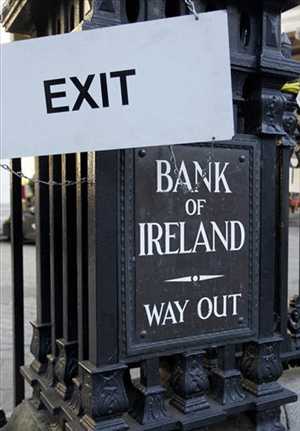Tens of thousands of demonstrators are expected in Dublin to oppose the government’s harsh austerity plan, aimed at slashing the country’s budget deficit to meet the terms of a bailout for its humbled economy.
The labor union-organized rally Saturday follows Irish Prime Minister Brian Cowen’s announcement Wednesday of a four-year package to cut spending, raise taxes and ax thousands of state jobs, the toughest budget measures in the nation’s history.
Cowen acknowledged that living standards will fall, but insisted action is needed to tackle a 2010 deficit running at 32 percent of GDP, the highest in Europe since World War II.
His government will unveil an emergency annual budget on Dec. 7, which must be passed to allow an euro85 billion ($113 billion) loan from the European Union and the International Monetary Fund.
Ireland’s Congress of Trade Unions — an umbrella group which represents labor unions with about 832,000 members — said the protest would be a final chance to influence the budget.
“It’s difficult to see any justification — either economic, social, or indeed moral, for what the government proposes to do, and we’ll oppose them in every way we can,” said David Begg, general secretary of the group.
Cowen’s 2011 budget will seek euro4.5 billion ($6 billion) in spending cuts and to raise an extra euro1.5 billion ($2 billion) in taxes.
Though he is expected to have the plan endorsed at Ireland’s parliament, his governing Fianna Fail party lost a special election Friday, reducing the government’s majority.
Cowen has vowed to call a national election after the 2011 budget is passed into law.
Sally Anne Kinahan, of the labor union congress, said Saturday’s protest would allow people to “express their frustration and fear at the direction government policy is taking us in.”
Some have expressed surprise that Ireland’s public has so far restrained from rowdy protests. Greece saw violent clashes ahead of its own bailout, and imperiled Portugal has suffered a daylong strike that partially paralyzed public services.
In Ireland, demonstrations so far have been esoteric, not angry.
Comedian Morgan Jones led a silent protest Tuesday outside Parliament.
In September, artist Fergal McCarthy floated giant Monopoly pieces — red and green houses — along Dublin’s River Liffey, to highlight real estate speculation which prompted to bailouts of some Irish banks.
Begg insisted the city center protest — a march to the General Post Office, headquarters of the leaders of Ireland’s 1916 uprising — would be free from violence.
Even so, Irish police chief superintendent Michael O’Sullivan said officers would be on guard for trouble. “There are individuals and groups who seek to exploit such events for their own ends,” he said.
Labour Party deputy leader Joan Burton has urged demonstrators to consider the image of Ireland that violent protests would send across the world.
“I appeal to people in some of the smaller political organizations — I know some people are mad as hell and do not want to take anymore — not to be used as photo fodder presenting the worst image of Ireland,” she said.

By DAVID STRINGER and SHAWN POGATCHNIK ( mail times )
Osman Kadri Koca – Economist
Media Watch